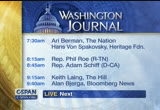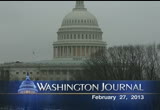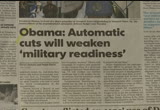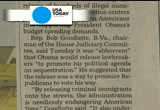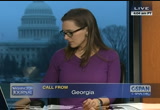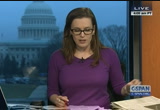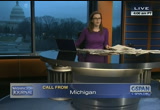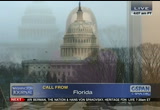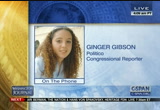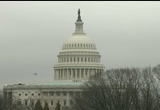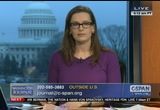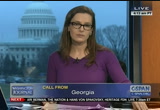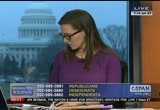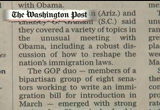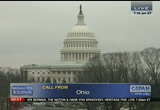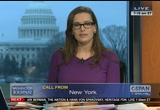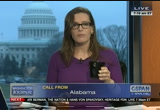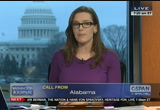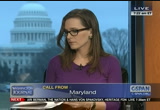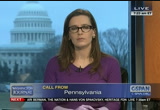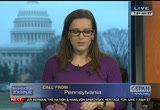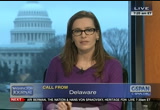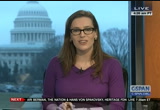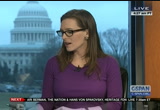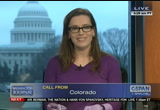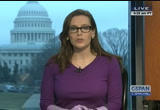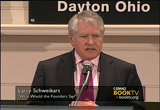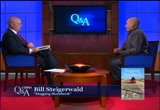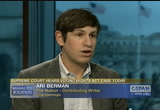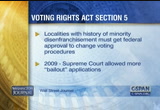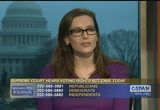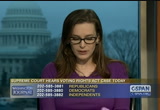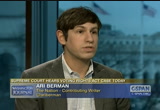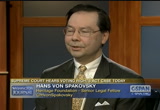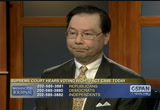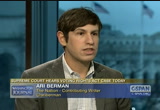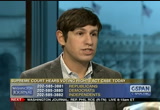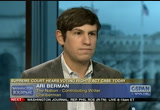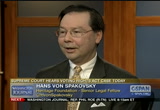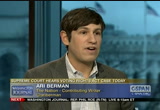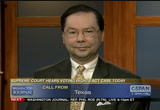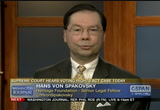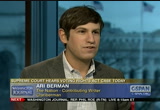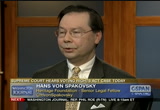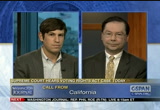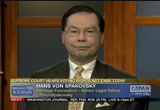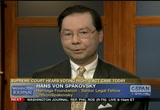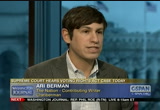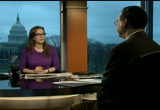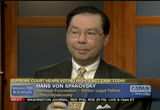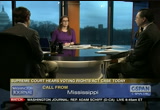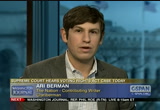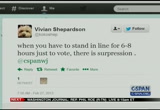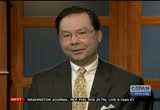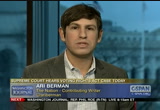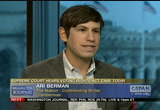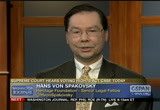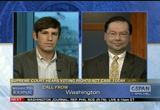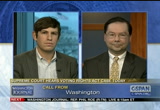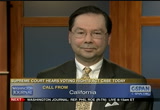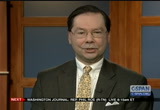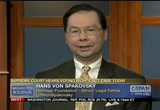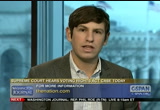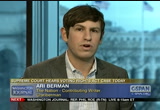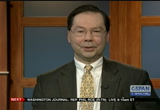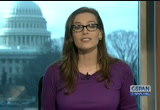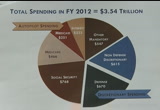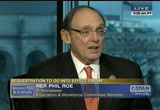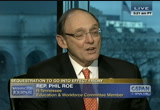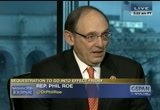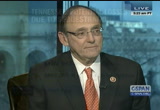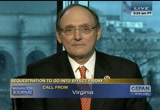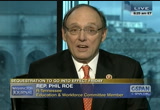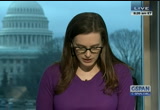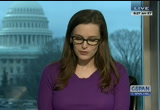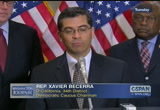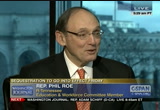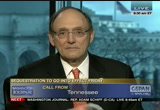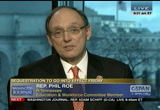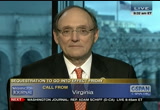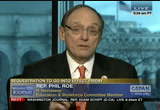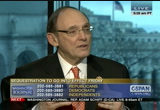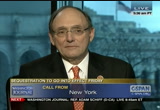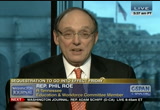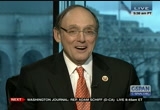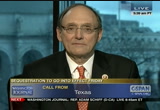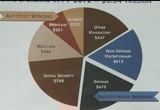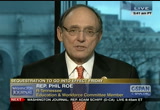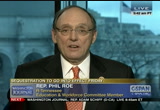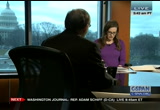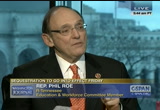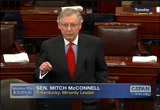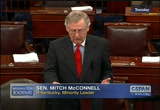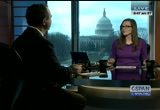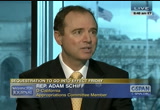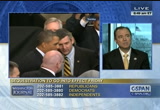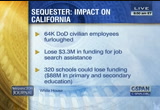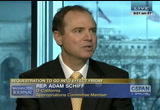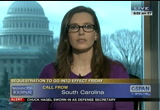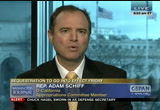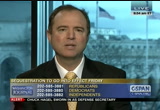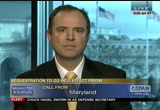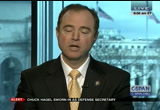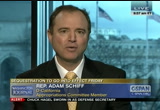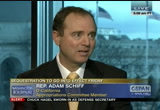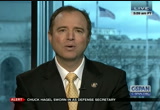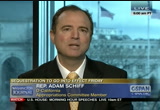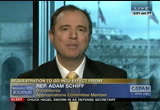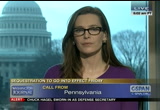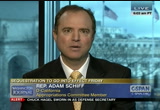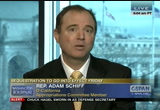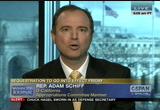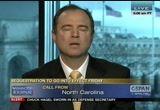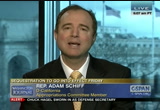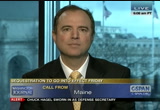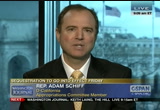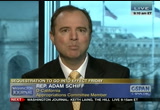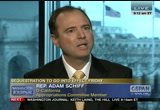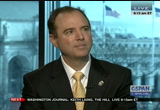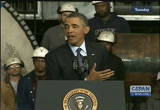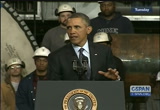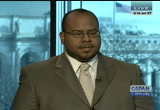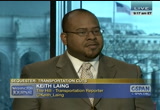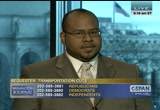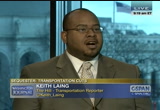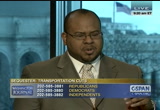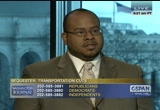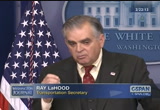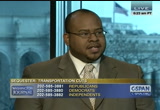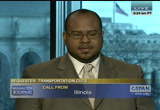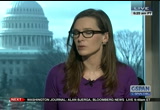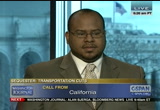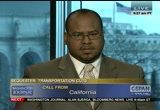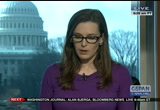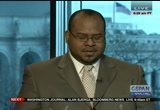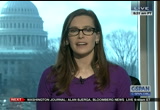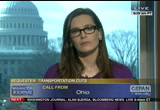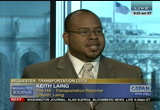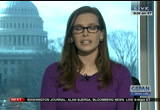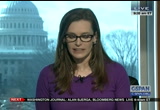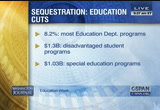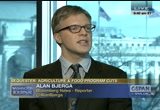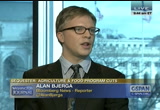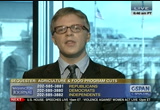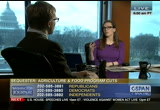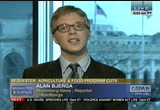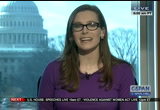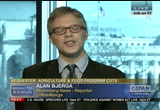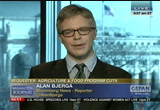tv Washington Journal CSPAN February 27, 2013 7:00am-10:00am EST
7:00 am
and a discussion on how the cuts will affect the travel industry. good morning and welcome to "washington journal." the house and senate are in t oday with just two days left until the sequester kicks in. the senate confirm chuck hagel to be the new defense secretary. jack lew passed through committee to head the treasury. we like to hear your thoughts this morning. here are the numbers to call.
7:01 am
7:02 am
host: the headline on the story from "the new york times.' republicans are calling the impact overstated and citing spending as a key issue. here is what americans are saying. "the wall street journal" has a new poll. you can see the breakdown of numbers on the opinions of what each is opposing it to do. a 29% approval rating in terms of the sequester. 57% disagree with what the republicans are doing. 1/5 of respondents do think
7:03 am
7:04 am
host: here is another headline about the misuse of power. we like to hear your thoughts this morning. caller: president obama will release over 10,000 dangers illegal aliens that are guilty of drunk driving, rape, murder. he is going to release all these people to -- this is on the same day that the sequester would go through. there is no need to release these people. we have the money to send these people back. the paper is wrong about 300. host: where are you getting your
7:05 am
number? caller: off of a news program. host: do you know which one? caller: we have almost 1 million illegals come through our county each year. host: hundreds of detainees have been released in recent days in an unusual effort to save money. host: a couple other stories in the news. chuck hagel is confirmed as defense secretary after a battle and as budget cuts loom.
7:06 am
from michigan on the democrat's line. caller: good morning. about the sequester -- it is a made-up thing between the parties. the budget has been going down as a percentage of spending. the budget has gone down five years in a row. i did nothing there is a question mr. obama it is going in the right direction. this will be a dark summer if the sequester happens. i wish republicans would wake up. democrats are organizing against them now. host: ben bernanke warned congress that the spending cuts would dampen economic growth this year.
7:07 am
this is from "the washington times." jan, go ahead. caller: if they are having trouble coming up with a budget, most of them are the attorneys. they all built their hours -- they all bill their hours. they are used to charge into some division. everything goes somewhere. i would love to know what they do with their time. they took how many minutes to vote on being adjourned so they had to stay there. this is like kindergarten. it is embarrassing. we need infrastructure and
7:08 am
people that could make things happen. i watched a bunch of guys and they made up information. we need to get more women in there. we could be doing five things at the time. host: here to tell us more is ginger gibson, a congressional reporter with "politico." what happened on capitol hill yesterday and in the white house? guest: there has been no actual progress. we did not get closer to a solution yesterday. there was a lot of talking yesterday. mitch mcconnell and john boehner will bring forward alternative bills.
7:09 am
each side is willing to put forth a proposal. they might bring forward more than one. there are some disagreements about giving the president more flexibility. john boehner said the senate needed to move and used colorful language. we did not see bills or talks. there was no changes as of yesterday. host: we are seeing the president on the road. what is their role? guest: a lot of pressure from the white house that something needs to be done. not seeing a lot of it sitting down at the table. the first place we will see bills get past is the senate. they will put forward a proposal that is half tax
7:10 am
increases and a lot loopholes and tax credits. private jets, oil and gas, things of that nature. that is through some discussions with the white house. but not bipartisan talks. host: one of your colleagues has a story with this headline. president obama and john boehner are talking but not to each other. "he offers a non-starter." are we hearing details about what the republicans and the white house might offer? guest: some would like to give
7:11 am
the president flexibility over the sequester cuts. mitch mcconnell said he would agree with that. that would allow the administration to decide where those cuts go into effect. a program that provides food for pregnant women and their children, head start, taking deep cuts under the sequester. that would allow the cabinet secretaries do decide. other republican proposals -- that is hard to get bipartisan support. we are hearing from the white house that taxes and closing loopholes has to be part of the discussion. host: ginger gibson, thank you so much.
7:12 am
chris in wyoming, good morning. caller: i think compromise -- republicans and democrats get together. i don't think we need a lot of new taxes. we are addicted to spending in this country. politicians have given us what we have asked for. we're still addicted as a society to spending. the key word everybody keeps using is deficit reduction. how about debt reduction? that would be something, some short-term plan for a balanced budgets.
7:13 am
host: a story says banks have seen their second most profitable year in 2012, from the washington times." host: there of the numbers and surging back up in last year. sam in georgia. caller: i would like to make a comment about the immigration and the requirements. lawyers in georgia charged $2,000, $4,000, $10,000 and they dragged the cases out forever so
7:14 am
they get more money. they are using the immigrants as a meal ticket. immigrants have no choice but to pay if they want to be legal and have a better life in this country. especially if you plan to marry somebody from another country. you have to spend to5,000 to go over there. meet the person for one day and come back and go through some expensive paperwork to get involved in this country. the immigrants are sometimes uneducated. the ones that do come over here have to live in unsanitary conditions.
7:15 am
the work for a fraction of what the regular american people do. the chamber of commerce gets taxes from the government and use that money to write the unions. host: you mentioned immigration. here's a story from "the washington post." host: don from ohio, what story is catching your eye? caller: hi, libby.
7:16 am
there are so many things. immigration. if congress would have been doing their job, we wouldn't be having this problem with immigration. that should have been taking care of. the people that was running on the green party, the socialist party, constitution, libertarian in the presidential election. those people should get together and call that another party. we the people of the united states. we are not getting our money's worth. they should take a 20% cut in pay. they have not been doing their
7:17 am
job for four years now. -- 40 years. tax reform has been put by the wayside. we wouldn't have that problem today if they had been doing their job. host: thank you for the call. a look at the washington times." we have a question about defense. a couple of foreign news items. the administration is close to indecision on syria. officials said the obama administration is close to deciding direct assistance to rebel forces in syria.
7:18 am
7:19 am
tax cuts. the first thing he says after that is, let's cut farm subsidies. there is something wrong with this picture. i think we should throw away the keys to air force one and two. they are costing us millions of dollars every time they get on a plane. thank you. host: good morning. caller: good morning. i am concerned about the situation going on. i think there is an underlying problem. when they figured out the books and dutch trade, they realize
7:20 am
president bush had not put the afghan war or the iraq war on the books, nor did they appropriate the money for the drug plan that was instituted. that is how the debt got to be so high. everybody is saying president obama created this debt. the debt has gone down under president obama. he has made a lot of savings. there is something wrong in the republican party. host: what did you think about the confirmation of chuck hagel as secretary of defense? caller: i think that mr. hagel
7:21 am
had not been around the congress in a long time, which meant he did not know all the ins and out of that ever think that happened. i think he was nervous and didn't do a stellar performance because i think he was nervous. i am sure he has the chutzpah to do the job. host: we have some comments about the chuck hagel confirmation. host: chris is concerned about the media.
7:22 am
dorothy in baltimore, go ahead. caller: how are you doing this morning? the reason why we cannot get anything done on the sequester is social security and medicare. the republicans want social security and medicare dealt with. they really do. this is what they want. if they could get that, they would go along with everything. the border thing and the immigration thing. this has been going on for 40 years. we need to put new people and there. we need to screen the people that are going to run for office.
7:23 am
asked what we want. maryland togo from pennsylvania to francis. caller: good morning. i was watching it house committee on immigration yesterday. it was one of the house committee members. he mentioned the fact that 40% of all illegals come here through international airports like harrisburg, pennsylvania. he said they overextend their visas. when they do that, they are illegal and they do not go back to their original country. he said 40% of all illegals come
7:24 am
through that way. that is not hard to stop. do not give as many visas. i think every black i heard on c-span, they love obama. this is crazy. host: how do you know what raise our callers are? caller: i can tell. i am a writer. i have heard this for 40 years. that is why he swore his hand on the bible. host: you think martin luther king was a radical? caller: it is in a book i have.
7:25 am
he was told to tell dr. martin luther king not to be around a man. host: we have a picture from " the washington times." there is a memorial on the mall. we will be talking more in just a moment about another african- american who will be memorialized in the u.s. capitol. there will be a statue for rosa parks commemorating her civil rights fight. christine from delaware. caller: hi. i want to say i have been listening to them talk about releasing illegals that they already have detained before this sequester even hit.
7:26 am
if they do releas the illegals go off and murder an american citizen, obama should be held responsible for that. that is an impeachable offense. he is doing that to harm the americans. host: here is the headline in 'usa today." are st.e house andn ic ice it is all about budget cuts. we will talk about sequestration for food safety and transportation. robert in california, good morning. caller: good morning. thank you for c-span. you educate me every time i
7:27 am
watch. we are all americans and we should stick together. how does the world look at us? we are supposed to be the greatest country in the world. i do not get it. they are not doing their job. they are causing this country to be embarrassed to the world. host: a comment on twitter from fred. "what programs the is the president want to cut?" another comment on twitter about chuck hagel. rory from florida is our next
7:28 am
caller. let's go to nelson in colorado springs. good morning. you are on the show. caller: thank you. there is a lot disrespect for the president of the united states. they talk about senator mccain and there is a presentation before him. they knew the budget cut was coming two years ago and nobody did anything. are the senators to include the president take a 20% pay cut? host: thank you. rosa parks will be commemorated in a statute in the capital.
7:29 am
in her now to tell us more is the sculptor, eugene daub. thank you for talking with us. tell us how you were selected to create the sculpture? guest: it was decided by the nea, and it was a national competition. there were over 150 entries. that was narrowed down to five finalists and they competed. host: this will be in statuary hall in the capitol building. "the first full-sized statue of an african-american in the capitol."
7:30 am
guest: the first african- american woman in statuary hall -- there is one other in the capitol. it is a tremendous honor and privilege to do this and i'm excited about today. host: we will see the unveiling in just a couple of hours. what did you learn about rosa parks? what about her did you want to communicate for your piece? guest: quiet strength and dignity, a determined look but not anything unpleasant or challenging. just a quiet, determined person with a tremendous amount of courage. host: a parks made history back
7:31 am
in 1955 by refusing to move in the back of the bus. she is making history again this week. we've not seen the finished product. what were the logistics in getting it across the country and getting it set up in the capitol/ guest: my part him not to coordinate the movement of that. she was in a crate for a while. i saw some photographs. she weighs 2,700 pounds. she was lifted up with an extension grain and guided into statuary hall. host: your firm has done other sculptures.
7:32 am
guest: i don't think there are any as high-profile as this one . we have done jefferson and lincoln and lewis and clark and other famous people. rosa just creates a stir and i think it is timely with black history month and her 100th anniversary. everybody loves her and remember sir. host: eugene daub, the sculpture of the rosa parks statue. leaders of congress and president obama will be on hand. thank you for talking with us today. we will look at the voting rights act coming up. our guest will tells more in just a few minutes. we will be right back.
7:33 am
[video clip] >> you have to understand the primary concern -- >> the number one concern was with national security. what would they say about lockheed? i am of the opinion of that based on how they acted, they would have favored a bailout of lockheed because it supplied the united states at the time with its top fighter jets and reconnaissance airplanes.
7:34 am
i think you can make an argument that they would have supported the bailout of chrysler back in the 1980's but not the bailout of chrysler today. what is the difference? chrysler back then made tanks and they were our only tank manufacturer. it is interesting when chrysler comes out of debt and repays the government loan and comes back to health. the main way they do so is by selling off the tank division. and plowing the money back into the company. >> author and university of dayton professor larry schwei kart will be on in-depth at noon eastern on book tv on c-span2. >> at one point he had to write a small paragraph that said
7:35 am
people are asking what happened with charley. elaine and john and not charlie and john. somebody must've said, where is charley. steinbackoad -- wrote about a page and a half. that never appeared in the books. editors went in and exploit the land entirely. almost 30 days of elaine's presence with john on the west coast. there are basically on a vacation. >> the author contends that steinback so many
7:36 am
liberties it could not be classified as fiction. >> "washington journal" continues. host: the supreme court hears about the voting rights acts today appeared to talk about that we have [video clip] a-- we have ari berman and hans von spakovsky. why was it put into place? guest: the states ratify the 15th amendment. what happened is we get the jim crow era. black voters were disenfranchised in the south. there was a need for more congressional action to enforce
7:37 am
the promise of the 15th amendment by abolishing literacy tests and to give their right to vote for minority voters. host: the voting right act has various sections. section 5 is in play today. guest: the entire voting rights act is not being questioned today. section 5 is the special provision that was supposed to last five years. it required a small number of covered jurisdictions to get pre approval from the government of any change in the voting laws before they could become effective. it has been renewed four times at what expire in 2031.
7:38 am
host: it is just one part but you see the crucial aspect of the law. guest: it shifts the burden of proof onto the states to prove their voting changes are not discriminatory. the congress would strike down voter suppression lost in places like alabama. what happened is section 5 was designed to make sure places like alabama had to go through the federal government. there's nothing like it in the voting rights acat. host: how crucial do you see section 5 to the law? guest: it was needed in 1965 because of the widespread
7:39 am
discrimination in the self. -- in the south. today it discrimination can be easily remedied through section 2. that bans discrimination in the voting contexts. section 5 was put in place because governments were trying to evade court decrees. there has been the kind of discrimination in decades. host: you can join the conversation and here are the numbers to call. republicans, 202-737-0002. democrats, 202-737-0001. independents, 202-628-0205. host: people remember that as
7:40 am
bloody sunday. it was signed by president george w. bush. why are conservatives trying to destroy the voting rights act, a piece you had in "the nation." guest: there is still a split among conservatives. you have amicus briefs being filed in support. i do think there's a split within the republican party. they're moving away from supporting section 5. the republican party itself is more conservative and more southern then was back in 2006 . the supreme court is less predisposed to rule in favor of
7:41 am
minorities when it comes to racial discrimination cases. it is no coincidence with that challenges before the voting right act in 2009 and 2013. host: tell us about the cases before the supreme court today. elby countyl b versus holder. this is a very important point. the way congress to turbot which states would be covered was based on low voter registration
7:42 am
turn now in the 1964, 1968, and 1972 elections. congress did not update the triggering formula when it was renewed. one of the recent congress did not update the form what is if they had, none of the states would be covered today because the differential between white and black turnout has virtually disappeared. in some elections in mississippi and other places, black turnout has been higher than white turnout. thsection 5.ook at
7:43 am
host: let's look at a map showing the state's and where you have to get federal approval for any changes in the voting law. guest: it is the best formula that congress has figured out. those jurisdictions were 25% of the population but account for 80% of successful lawsuits. discrimination is still concentrated in these places. we saw all these new voting restrictions introduced. look at the states that are covered by section 5. 2/3 passed new voting
7:44 am
restrictions since then. there has been a lot of study before 2006 and afterwards showed the covered jurisdictions. it is still accurate today. it is not perfect today. is it better than not existing at all? congress says it should exist based on the current formula. host: hans von spakovsky is a senior legal fellow with the heritage foundation. otis in houston, texas. caller: good morning. i do not think we need the voting rights act. can you hear me? i am a black man.
7:45 am
i hate to see people like obama manipulate the division in this country. it is 2013. i think times have changed. that is my opinion. look at the places you cannot -- voting is a privilege. that is something that changed the world. i think we'll need to change with the times. guest: i think texas is a case study on why we still need section 5. the federal courts found that texas redistricting map was
7:46 am
discriminatory and would have diluted the minority vote in texas. voteralso blocked texas' i.d. law. registered voters did not have that form of government-issued identification. texas had -- hispanics were twice as likely to live without access to dmv without having a car. if there was no discrimination, why are the courts blocking two major -- guest: the problem is nobody claims there is and still discrimination that occurs.
7:47 am
the discrimination are isolated cases which can be easily remedied. his claim there is evidence of more discrimination is untrue. this is laid out in the dissent written by one of the justices. the covered states have hired rates of registration and turnout of black voters than the rest of the nation. the covered states have a higher proportion of black officials then non-covered states. two of the states would be worse. illinois and delaware. host: here's a map from "usa today" show in the percentages of blacks serving in the
7:48 am
legislature. guest: there are a lot black elected officials but they have less power in the south. over 50% of black legislators serve in the majority. there is a power imbalance in the south. you have to look at all these other factors in terms of what these states are trying to do to make it harder for these populations to be able to vote. the lawsuits are very costly and put the burden of proof on the plaintive. there's no equal the four section 5 and section2. they are totally different and a lot of things are being blocked
7:49 am
that would go through under section 2. host: we are talking about section 5. our next call from dallas, texas. caller: good morning. why would the conservatives in the southern states and even in some northern states, why would they gerrymander their districts to control the vote if they were not afraid of section 5 and what the voters would want? what would they not let the process work itself out instead of trying to make a reason for them to be able to win? the guy in pennsylvania wanted mitt romney to win and the
7:50 am
voting rights logs they were creating was the reason. why would you not say that section 5 is still needed? guest: the supreme court recognize it was an intrusion into state sovereignty. it was justified because of the unique circumstances at the time. the discrimination does not exist today. with regard to voting i.d. law s, one of the bad things about section 5 is that the make race a predominant factor in redistricting. that hurts black officials that want to run statewide. they are in many ways
7:51 am
partitioned into predominantly black districts where rather than working at attracting other voters, they tend to be more towards the extreme side. one of the reasons republicans have done so well in section 5 states is because of the requirement for creating majority-minority districts. makes them stronger for republicans. there is an unholy alliance to keep section 5 in place. .ost: let's go to a tweet what is your response to that, ari berman? guest: section 5 remains regrettably necessary.
7:52 am
look at alabama and mississippi. 15% of white voters are voting for the president. we're not in a situation where we do not need the protection. states can get out of section 5 if they are not discriminating. redrew a place that's its richard king maps -- redistricting maps. the only african a member of the city council lost his seat. seems like a perfect reason why we need section 5. the only black member lost his district. this stuff happens more often in
7:53 am
places like alabama, texas, and mississippi. so many different people are urging that section 5 be upheld. host: we have a tweet for you from maverick. guest: well, if they say it needs to be expanded, that would treat state the same. ari keep saying there is more demonstration -- discrimination in cover states and the facts don't bear that out. there's no evidence that states are evading court decrees or otherwise practicing discrimination, and that's what led to passage of section 5. section 2 remains.
7:54 am
that was the only objection in the entire state of alabama in the last 12 years. one objection. the entire state should be remain covered under section 5 because of one objection? host: sacramento, california, dj. caller: voting is not a privilege, it is a right. i should not be restricted because of my color in that pursued. you guys never have the interest of black people, the images of black folks at your heart in terms of positions you take.
7:55 am
if you say racism is done with and we do not need section 5, that is the only way you commit an argument to not be continued. it is clear that it is still needed. is the recourse if the court strikes down -- if the courts strike it down, what is the urse?d guest: it's those kind of attacks that are coming from people that did not have substantive arguments on their side. i would point out on voter i.d. went georgia passed its law,
7:56 am
there was a voting rights lawsuit filed in georgia and the courts found it was not discriminatory. the court found it was not discriminatory. voter id is not a discriminatory provision. the turnout of african american voters in places like georgia went up after their laws went into place. section 5 will in no way change the remedies that people discriminated against have. section 2 and other provisions will remain in place. they can be used to remedy the discrimination that still occur. host: our caller asked about
7:57 am
what happens next. give us more details about the shelby case. guest: minority voters will have less recourse in the south if section 5 is struck down. there will be fewer protections for those districts. a section 2 lawsuit takes a long time. pledges to not have the money to bring those cases. the burden would shift to those cases. it is difficult to bring those cases. look at alabama. they passed a voter id law that requires proof of citizenship and there'll be more of that
7:58 am
coming. election laws in shelby county were judged discriminated based on race. this is recent history in those places. this is based on things that are happening from the past few years in the past few decades. places with a clean record in bailout but places like shelby county cannot bailout because they are discriminating based on race. host: the supreme court expanded eligibility to seek exemption. this is from "the wall street journal.' out.: states cannot be allowe
7:59 am
you provide certain evidence. if the court believes you can get out from under, section 5 will no longer apply to you. there has been no objection to win the statewide voting change in alabama for the past 25 years. they are responsible for all the political subdivisions, all the towns and counties even though the state government has no control over what city and county governments do. they cannot bail out if one town gets one objection in the last 10 years, even if the rest of the state has been completely cleaned. ari mentioned proof of citizenship. georgia passed a proof of citizenship requirement several years ago.
8:00 am
the obama administration said it was not discriminatory. host: our guests are hans von spakovsky from the heritage foundation, and ariand ari berm. to author of " the fight reshape american politics," which came out a couple years ago. let's hear from jackson, mississippi. jason, republican caller. caller: thank you. there is a couple of really somewhat offensive and i think -- i need further explanation and so do the listeners. the claim was stated moments ago about title v and saying it is clearly needed. an example is, for instance, more than 50% of white voters in mississippi voted for president obama. that is a fallacy.
8:01 am
the claim does not support the supposition. what is the proof, then, without the biases? to understand the nature of political bias? from these claims, the heritage fellow stated, real claims against alabama have not been present or credible. so i don't understand why it's sort of makes me think i am listening to a radio show from 1950 when in fact it is 2013. host: we go to mr. berman for a response to that. guest: in 2001 it was a majority black town in mississippi. but the governing board, the mayor, and the city council were all white. in 2001 when there was going to be elections and it was clear that black voters were going to be able to win seats in that
8:02 am
election, the government canceled the election because they did not want to see -- to cede power. they were told you have to hold the election. as a result, they elected for the first time a black mayor and three black city council members. that is exact to why section five is still needed, particularly in places like mississippi, where this happens more often, and places like ohio and michigan. host: "the person alleging discrimination should always hold the burden of proof. why shouldn't the voting rights act be different? "when you have to stand in line for six to eight hours just to vote, there is suppression." on the democratic line, hi, chris. caller: great job, ari, and i
8:03 am
have read your book. good morning, mr. speck koski -- mr. spakovsky . evergreen, alabama, is also a state that you should -- this is not the only state it is being challenged at the present moment. my question is this. would -- which supreme court justice will be the swing vote in terms of the voting rights act, section five? we know john roberts has indicated he would like to do away with this law. protectst: it is tough to the supreme court. but i would point out that in the case where this situation came up before, in 2009, the texas case we talked about earlier, eight supreme court justices talked about the
8:04 am
problems with the possible constitutionality of section five. i really don't know how the justices will come out on this. i don't want to predict. ari may want to do that. i think it is impossible to tell. guest: i am not going to predict either. i think in terms of healthcare we have learned about the unpredictability of the court. justice kennedy is likely to be the swing vote, as he is in so many cases. you look at the 2009 oral arguments, and justice kennedy said he understood the value of section five, he understood the insufficiency of section two and the remedies. he was concerned about the application among states. as he put it, "the sovereign dignity of alabama was less than the sovereign dignity of michigan." so it will be the up to the government and those arguing in favor of section five to convince justice kennedy at
8:05 am
section five needs -- the relevance of it today outweighs the federalism concerns he was talking about. host: we just saw a photo in the new york times recently that justice kennedy -- what did you learn about the 2009 case that allowed for more bailouts? who else were big players, ari berman? guest: one theory is that there were five votes to overturn section five. liberal justices threatened to write a pretty scathing dissents. even justice roberts got cold feet. but it is speculated that justice roberts has five votes to strike down -- overwhelmingly, it has been signed four times by republican presidents. so there is a bipartisan consensus for the voting rights act that is held for nearly 50
8:06 am
years. for five justices to get rid of that bipartisan consensus would not only be very disturbing in terms of what it would mean for voting and dissemination, but it would also raise issues in terms of the relationship between congress and the court when it comes to the different distribution of power in the government. host: looking at the decisions of chief roberts. chief justice roberts -- how influential will he be? guest: he basically said on -- on stopping discrimination up from race them is to -- from racism is to stop disseminating. a case was all about the abuses, the abusive enforcement practices of the civil rights division of the justice department under section five. they castigated the civil rights division in that opinion, justice kennedy did. in fact, in that case, not only
8:07 am
did the justice department lose , they ended up having to pay $500,000 in attorneys fees and costs. host: the next call from lakewood, washington. halley, independent line. caller: good morning. first of all, thanks for being on this morning. i want to say good morning to him mr. von spakovsky and mr. berman. guest: good morning. it is very early morning for you. caller: yes, it is. my question or comment today starts with the fact that i am at bicoastal resident. i live half the year in lakewood, washington, and the other half of the year in alabama. living in these two places and seeing the vast differences in the educational levels and the
8:08 am
way that people perceive the right to vote, and then asking them in the black community -- because i am an american negro, and i am not accepted in the black community because i like to be called a negro. that is part of the discrimination objective fighting the american people, period and point-blank. it took me a long time to learn that. i didn't understand being raised in illinois what the problem in the south was and their whole issue with the racism thing until i moved to alabama. i got there, and it was like the naacp, please do not copy off because i am very serious. i am looking at my notes. the naacp was very pressed to keep putting out how the white man was suppressing the black man. i posed the question, is anybody out there really educating the black community?
8:09 am
are you taking missionaries to these meetings because a lot of people do not understand the word -- are you taking dictionaries to these meetings because a lot of people do not understand the words being utilized? a lot of that community is illiterate. are you even helping them with the problem of dyslexia, which also runs rampant in that community. i am dyslexic. host: ok, let's go to ari berman. our caller is talking about the african-american community. she is herself african-american. guest: i am not sure i have a response, so i will take a pass. host: let's go to vida, republican line, in california. caller: my question is to the heritage foundation. i am a republican. i am very disgusted with the republicans and the way they are conducting their behavior because voting rights and also the way that the whole concept
8:10 am
of going back in history and trying to remove a lot of the constitution of the united states of america, going back and using the forefathers to create this new society and taking it back in history instead of moving forward. the reason why we have the voters rights installed is because we have practiced bad behavior. that is the reason we have laws, to try to correct our behavior because people practice that behavior. host: let's get a response from hans von spakovsky. guest: no one is trying to go backwards. it is important to stress this again. the main provision of the voting rights act is nationwide and it is permanent. that is not the issue up today. only one small provision that was originally supposed to last
8:11 am
only five years -- and it takes the extraordinary step of telling state and local governments that it cannot make changes in their laws without getting the approval of the federal government. there is no longer statewide systematic official discrimination in the south that would require that particular provision to stay in place. host: the voting rights act reauthorize last in 2006, signed into law by president george w. bush -- why didn't they deal with section five then? why didn't conservatives try to pull that out if there are issues with it? guest: there was testimony about this, including by edward bloom, profiled in "the washington post" this past weekend. there is an unholy alliance between democrats and republicans because republicans believe that section five, with its requirement to have race be a predominating factor in redistricting, has actually
8:12 am
helped them and has actually isolated democrats, particularly black democrats, in districts where they are not going to get the kind of political support, build up the kind of coalition they need, then run statewide in other places. they were not voting really based on principle as much as partisan advantage, and politically it would be very costly to come out and say anything against section five voting rights act. host: ari berman? guest: the justice department objected to for changes in texas, south carolina. three or four of those laws were blocked, ruled in favor of the justice department, and blocked the south carolina voter id law for 2012. so clearly the courts are in sync with the justice department on this. you look at how the lower courts have ruled on this case, the
8:13 am
district court and the court of appeals ruling against shelby county's challenge to section five. a george w. bush appointee, justice bates, was a fifth. -- says this -- "following 100 years of disregard for the dictates of the fifth amendment." so both republican and democratically appointed judges have ruled on the case and upheld section five. not just because of an unholy alliance between republicans and democrats. it is because this is the most important and effective provision ever passed by congress to prevent discrimination in voting before it occurs. to get rid of this law would be to get rid of what eric holder described as the keystone of our voting rights. host: one last call. ellis in pensacola. democratic caller. caller: good morning. i guess i am calling about what
8:14 am
han hans has said here. his argument is very specious. he indicates there are more voters in these areas that -- but leaves out the supposition that that is possible because the laws are there. that is it. my comment to the people listening to this -- look at the names of the organization. the nation, heritage. which one is more inclusive? the heritage foundation has never come down on the side of a person of color. which one is more inclusive? host: we will get a response from hans von spakovsky on that. guest: that is not a substantive discussion of the issue. it is a personal attack that brings up biases that are not true. ari just said last year there
8:15 am
were four objections. one was overturned. so there are only three objections. there are more than 12,000 jurisdictions covered under section five when you include the states, the counties, and local towns and cities. four objections -- actually, only three valid once -- out of 12,000 jurisdictions, and those 12,000 jurisdictions should stay covered under section five? those objections could have easily been taking care of by the justice department with lawsuits. they could have immediately dissed out -- they could have immediately thi stopped it with lawsuits. the justice department would not have the resources to pursue three lawsuits -- would not have the resources. to pursue three lawsuits is ridiculous. that is not the case. guest: we are talking about a lot of voters that would have been impacted in places like texas they step on these voting
8:16 am
objectives. no one is under any illusions that if section five goes there will be more voter suppression attempts, new voting restrictions. we are not going back to 1965. but it will not be like the conditions today either. host: you can find his peace in "the nation or our other guest, hans von spakovsky, which they -- with the heritage foundation. watching the supreme court as they take up oral arguments on this today. thanks for being with us today. coming up next, we speak with members of congress. records and it is phil roe, republican of tennessee, is our guest. speaking on the senate floor, senate criticized and rational republicans for intransigence on preventing the sequester and its cuts. >> these cuts will take place. on friday when this kicks in,
8:17 am
not everyone will see these cuts on saturday. but they will kick in. people running these agencies, people who run the pentagon. i met with the chairman of the joint chiefs of staff) we left. these cuts are going to take place. they will be felt with defense more quickly because agencies have not rehired the people that they could have. because of the essential nature of what the military does. they have not done that. the cuts to the military will kick in more quickly. the other cuts, as the weeks move on, you will see more and more people who have been hurt in the non-defense fields. the effects are cumulative and they are going to hurt really bad, mr. president. we want to work with republicans to come to a balanced responsible way to reduce this sequester, the impact of it.
8:18 am
my republican colleagues are standing in the way. they only want cuts and more cuts. they are willing to sacrifice three quarters of a million american jobs rather than ask to pay a penny more. mr. president, 56%, almost 60% of republicans around the country support this balanced approach that we have. republicans around the country support this, in addition to independents and democrats. the only republicans in america who do not support this balanced approach are the republicans who serve in this count -- in this congress, the senate and the house. three quarters of americans, including almost 60% of the republicans, are crying out for a balanced approach. our economic recovery from this latest crisis, it is time for republicans to work toward a solution instead of being part of the problem. host: cumbersome and phil roe,
8:19 am
republican, of tennessee, representing the first district. thank you for being here this morning. guest: great to be here. host: talking about sequestration, what is your position on it? do you support it going forward? guest: let's look at the history of sequestration. and you look at the edit deficit that we have, something that helps me a lot if you can show this -- if you look at the pie graph we have right there, it shows you mandatory spending that we have, about 60% of the budget, and discretionary spending. what is discretionary spending? it is the department of defense , commerce, homeland security, fbi, national parks, so forth. i bet that is so large, if you cut all discretionary spending, we still have a budget deficit and would have the past four or five years. as we bumped up in august of 2011 to our debt ceiling, we
8:20 am
had to vote to increase our credit card limit, basically. to do that, we had a bill called the budget control act. six democrats and republicans were to get together and avoid these so-called sequester cuts. let me put sequester in english -- it is basically automatic cuts that occurred. as we came to 18 months, i have been saying these are real cuts. no, you're not cutting any thing you're not cutting anything. these are real cuts, both the military and his cautionary spending. you cannot balance a budget by simply cutting discretionary spending. if it all went away, you would still have a budget deficit. so this friday we have across- the-board cuts scheduled to go in. the house last year passed a bill, two different bills, that would avoid the sequester. they would come from some other place. the senate has not acted on that. we are waiting for the senate to do something. what is the effect of it?
8:21 am
when they give you an example i can understand. if i am a family of four and i have a $60,000 a year income but am spending $100,000 a year , which is what the government is doing, borrowing $.40 of every dollar it spends, i am asking -- my credit counselor says to me we need to cut 2.5%. next year we need you to spend 97,005 hundred dollars. that is what we are asking to do. the argument is all cuts are not the same. some of these cuts going to both the military and to discretionary, i vehemently disagree with. i think we are. the cuts are going to happen friday, no question about that. but between friday and the 27th of march when the continuing resolution, the document that we run our countryur bget on, comes up, that will be about a month to work on a compromise. host: so you would like to see some way out of this. we talk about it going through
8:22 am
on friday, but in terms of the implementation, you do not want to see that happen? guest: the cuts i want to see happen, but not this way. host: the white house has put out a list of what these cuts mean. in their opinion, their perspective, in communities across the country. tennessee, or home state. tennessee losing about $15 million in funding for primary and secondary education, putting about 200 teachers and aides jobs at risk. approximately 60 fewer schools would get funding. you are on the education and workforce committee. what do you think? in tennessee we have about 65,000 teachers. if it is necessary, there will have to be some rearrangements, no question about that. i am a product of the public
8:23 am
school system. i started school in a two-room school with no indoor plumbing. i sort of overdose on education. went to school for 23 years. i am a physician. all of my children went through the public education system. i have a tremendous, tremendous amount of respect for the teachers that taught me. my two first-grade teachers i still remember, and we have to have an america of public education that works. host: do these cuts weaken the public education system? guest: it doesn't make it stronger, that's true. i would like to see different cuts happen. host: here's what else is happening in tennessee. $12 million for education could be on the chopping block. also for jobs. a for low of 7000 civilians, defense department employees. guest: the cuts are real, and
8:24 am
they need to happen. the government is too big and spends too much money. but all cuts are not exactly the same. you would like to see your education funded properly, and i hope we will get a chance to talk with some of our callers about this because we have done some great things in tennessee with our education system. i hope i get a chance to talk about that. let's go to -- host: let's go to mary, an independent from maryland. caller: i want to say a couple of things. first and foremost, if harry reid, democrats, and some republicans feel so strongly about the job cuts and things like that, making sure that teachers have the money they need to work and get the raises they want to give them and see other people get paid more, then why in the world would they
8:25 am
agree to allow the government to spend -- because they have already said they have money to do this -- why would they allow the government to spend money to 20use me, 11 million million illegals who are here -- guest: i was stationed at fort eustis, virginia, so i have a lot of fond memories of where you live in the state of virginia. i hear this all the time at home in tennessee. i am your next-door neighbor in the mountains of bristol. one foot is in virginia and one foot is in tennessee. i hear what you are saying exactly, that there is money being spent on people who are here illegally and we are having problems funding our own education system. i was the mayor of johnson city,
8:26 am
tennessee, and practiced medicine full-time. it is a town of 16,000 people. we highly value education. there actually are several funding streams for most school systems. in tennessee, we have 135. our school system is touted by -- is funded by county, state, and federal dollars. but the federal dollars are a lot less. you look at the entire status tennessee and these cuts, just our johnson city budget of education is over 60 thousand people. it is not a big cut. but i agree that any cuts are hurtful to our education system. host: here is a recent dory from "the times news." it quotes you as saying, "maybe we need to do this."
8:27 am
"the gop house has taken a stand on federal spending." hostguest: we absolutely have to something. you cannot spend for infinity $1 trillion more. no family can do that, no business can do that. ultimately, the consequences will be very dire for this country. there will be a debt crisis sooner or later. the eagle will not lend us money, and the federal reserve cannot continue to spend $85 billion. i find it amusing that in a $ 3.6 trillion budget, we cannot cut two percent of that. host: if you could have your druthers, you would see the cuts go through, but not for sequestration. but if one or the other, you have to cast votes. what are you going to do? guest: if i have no choice, i
8:28 am
will cast a vote to cut the spending. i believe both sides will come together in the next month, and i think the thing that is frustrating to me is the president should be here in washington, dc, working with congress am a leading, not cheerleading out in the country about all the awful things might happen. nothing awful is going to happen friday. host: one of your democratic colleagues, javier becerra, had to say, "they have done what they need to do, and the democratic response to that. >> there is no bill the house of representatives has passed in this republican leadership that can go to the senate that will stop these mindless cuts to people's services from taking effect. speaker boehner may be talking about legislation that was very partisan, that the house of representatives under republican leadership passed last year, but
8:29 am
i don't think i need to give the speaker ls and in legislating -- give the speaker a lesson in legislating great whatever was done last year that did not get signed into law has evaporated. it is gone. it does not exist. this is a new year, a new session of congress, and it is time for everyone to get to work. the house republican leadership must get to work, giving people a balanced, bipartisan plan. what is your response, congressman phil roe. guest: he is correct and incorrect. i have worked on many bills that have crossed harry reid's desk. the speaker is right, the time has come for the senate to come up with something.
8:30 am
it is speak in english. it means the way it is supposed to work here. it does not languishing there, it is debated and we vote on it. that is the way democracy works. it goes to a conference, differences are worked out. then it is voted on, up or down. senator reid has chosen not to let it work like that. host: let's go to the phones. lois, democrats line. caller: he is representing tennessee. it looks like each and every day we have a murder of someone attacked with guns and violence. sequestration, wanting to do budget cuts -- what about this crime? we need the police, firemen. the only time when our people from tennessee, republicans,
8:31 am
always say cut, cut, cut -- why don't you cut, raise those taxes on the rich people and stop spending money overseas? you say we don't have any money? why are you helping other countries? guest: i actually lived in memphis for 10 years when i was in medical school there. i love shelby county and certainly enjoyed my time in medical school and residency at the city of memphis hospitals. a couple points. i agree with you on one, that there is a tremendous number of people -- we spent $40 billion on foreign aid, and i have heard over and over again from democrats, republicans, and independents -- why are we sending money over there to people who do not like us? 40 years ago this month i went into the us army, served 13
8:32 am
months in the demilitarized zone of north korea. i had to spend two years in the military and come back and finish my education. we spent $1 million per soldier, per year, to keep a soldier in afghanistan. i support the president on leaving afghanistan. that will save a lot of money. your fire and police -- most of all, they are paid for by local dollars. we don't have a state income tax in tennessee, just sales tax and property taxes. that is how we fund the local police and fire. host: robert, from petersburg, virginia trade welcome. caller: good morning. esther roe, -- mr. roe, in the first section of the constitution, it states the house of representatives will solely have the obligation to raise taxes when the revenue is needed.
8:33 am
since it does not say anything about cuts, my point is, you all have an obligation to the citizens of the united states, not just the wealthy. to raise taxes on the people who have the money who can afford to pay it and the rest of the country, the majority that don't, it looks to me like that would be a no-brainer. i think it is going to take forever for the poor people in this country to get a fair shake. that is my comment this morning. thank you. guest: i appreciate your comments, but here are the facts. the top one percent of income tax earners in america, one percent, pay almost 40% of all federal income taxes. that is 40. the top five percent of income taxes in america pay 60% of all
8:34 am
taxes. and the top 10% pay 80%. the top 10% of americans pay 80% of all income taxes. they earn more money, but they are paying their fair share. what they need in this country is -- i got through physics, calculus, organic chemistry in college. i would not even attempt to do my taxes now, they are so complicated. i believe in closing loopholes. today we have the highest net corporate tax rates in the world in america. that makes us less competitive. we desperately need to redo our taxes, not raise rates, but to have tax reform. it makes more sense. those people are paying their fair share. host: he is a physician, running a medical practice for over
8:35 am
three decades. he served in the u.s. army medical corps. "the wall street journal" has a pole along with nbc news looking at how americans are handling sequestration and what he wants to do, how republicans in congress are handling it. 29% in favor of republicans in congress. 45% agree with president obama. are you doing something wrong? guest: i don't think so. remember who has the bully pulpit. we have a few minutes on c-span, but the president speaks to the entire nation when he speaks. he is the one who gets heard the loudest and will get listen to the most. but the fact are on our side. as we explain those -- and i think people understand inherently that you and i cannot spend $.40 more dollars -- $.40 more out of each dollar that we have to stay afloat. we can't do that. every income strata understands that. host: staten island, new york,
8:36 am
republican line. please go ahead. caller: a quiz question and a comment. -- a quick question and a comment. on the screen, they show that social security is not an entitlement. but every money i put money aside -- it is not an entitlement. it is not an entitlement. guest: i agree. caller: it is a trust. then they will be getting me some money back on a monthly basis. my comment is that the government is one of the largest in the world but it is one of the most efficient.
8:37 am
all of those employees, and businesses, different scales. the problem is that the government is inefficient. host: government efficiency, representing the government of -- referencing the government of sweden. guest: i paid into the social security system now for over 50 years. i totally agree with you. i am still paying into it and i am social security age. i completely agree. if you paid into that system as you have medicare, those systems will need to be reformed for our younger generation because they are not on sound fiscal footing right now. in medicare, the average medicare recipient gets three times as many dollars out as they pay in over a lifetime. i agree with you, the verbiage is wrong on that. efficiency in government is an oxymoron. it is the most inefficient thing i have ever seen.
8:38 am
i was in the real world for 31 years, practicing medicine, ran a medical practice, was mayor of a local community. i came here and it was shocking for me four years ago to see how -- to see the waste i have seen here. it is mind-boggling. the people where i live in tennessee are hard-working middle-class people for the most part. i don't want to waste their money that they worked hard for. i was in your beautiful city on monday. new york, great place. host: "why does congress always wait until we are facing calamity to do its job. is this any way to run the government? guest: the answer is i don't know, and no. i say this tongue-in-cheek. when i got here, i figured out that nobody in this place ever
8:39 am
got a term paper done on time. we waited until the last second. we do things badly when you do that. when you wait to the last minute to get it done, there are always things put in their -- for instance, the fiscal cliff. i could not hold my nose on some but it. i read that entire bill, the fiscal cliff bill passed at the end of the year. i was up here new year's eve and new year's day, had nothing to do, so i read the bill. it was amazing what's in there that you vote for that you would not ever do if you had an option to vote against it. host: mike in houston, texas, democrats line. you are on with phil roe from tennessee. caller: good morning. i just had a comment. i am on social security disability. i pay for medical out of social security disability. one of the big questions i have is that on the pie chart that shows social security, that is a
8:40 am
misnomer because the budget requests for the 768 is what the government has to pay back to social security, what the government will borrow from social security. in effect, except for people on social security supplemental income, everyone else pays into the system. so that 758 is what the government actually borrows. it does not matter whether it is a democrat republican, who is in the presidency. the government borrows from the social security trust. guest: good point. we talked about this yesterday. the budget meeting that we have, you are correct. the government, what they borrow and pay interest on, the amount of bonds and interest still pay all of the obligations of social security.
8:41 am
when social security was first envisioned, life expectancy was about 60 or in the early 60's when social security, president roosevelt first put this out there. ida may fuller was the first person to get it. she lived to be 100 years old and got $22,000 out. she hit the three apples on the one armed bandit. life expectancy has gone up and we are living longer. that is going to continue, and that is what has happened. actuarially, we are living longer. medical care is better. people are taking better care of themselves. when i got here in washington four years ago, i thought social security was a big problem. it really isn't. it will take minor adjustments to make it right. medicare is the big gorilla in the room. if you look at all the actuarial, all the predictions later on. we have 10,000
8:42 am
seniors a day hitting 65 years of age. that is the big budget problem, not social security. host: goal bureau, north carolina. dale, independent line. caller: it sounds like you are 100% sure that the sequestration will be happening friday. if that does happen, people working for general services, how will they be affected, and will they have to take a 20% pay cut? who can take a 20% pay cut these days? how will this affect the military retirees? thank you. guest: it should not affect military retirees. it should not affect the a -- it should not affect v.a. out ofcally moved va.a. it, so it is not affected except for some administrative costs. you will not have a 20% cut in
8:43 am
your pay. i cannot tell you exactly, but what we will do next week with the continuing resolution is to allow the cabinet secretaries or the president to have some latitude in these various departments about how they pay their bills, just like you would do at home. host: congressman, you mentioned being on the veterans affairs committee. here is a story -- the v.a. is protected from cuts, but the veterans may feel some pain because a lot of veterans have jobs that will be impacted. they now work for the federal government. weekly furloughs represented 20% loss in pay for many veterans, any of whom reenter the federal workforce, assuming their jobs and pay were guaranteed. guest: again, we don't know what the sequester ultimately will look like. but the cuts are real, and the directors of those various
8:44 am
departments can make adjustments to their budgets exactly like i did mine. in my office budget in the capital, we have had to cut 11%. we cut 11%. the sequester added another 10. so i am a staff member short. host: what about people who are members of your staff, or the -- guest: back to education for a minute come a so i don't forget. this year held grants are not affected at all. the idea part, disabilities, and others, these sequesters do not go into effect this school year, they start next school year. so it is not anything that will happen next friday. again, we will have a chance to work out -- the $1.2 trillion is
8:45 am
going to happen. host: cumbersome and phil roe, thank you for being here this morning. guest: thanks for having me. host: coming up next,, smit adam schiff, democrat from california. but first, mitch mcconnell accused the white house of their responsibility in its role on sequestration. here are his comments from the floor yesterday. >> as the chairman of the finance committee, helpfully reminded us last week, the president is part of the sequester because the white house recommended it. so now we are feeling the effects of it. so it is time for the administration to at least accept reality so we can all move forward and focus on what the white house is doing right now. it is asking the american people for permission to break its word on spending. asking the american people for permission to break its word on
8:46 am
spending. we reached an agreement to cut $2.1 trillion in government spending over 10 years, and we had intended to keep our word. should these cuts be implemented in a smarter way? you bet. but the president and his cabinet secretaries had a year and a half the thing about that. they just cannot show up at the last minute and expect the american people to bail them out of their own lack of responsibility. again, instead of engaging with us, the president just set up more roadblocks. for more than a year, he resisted and dismissed every republican attempt at economize. he refused -- at a compromise. he even threatened to veto compromises and that -- here we are presenting the contrary with two options -- the country with two options -- armageddon or a
8:47 am
tax hike. it is a false choice and he knows it. but the president is a master at creating chaos as an excuse for government in action. do nothing, fan the flames of catastrophe, then claim the only way out is more government in the form of higher taxes. the choice we face is not between the sequester and tax hikes. remember, we are only talking about cutting two percent to three percent of the budget. any business owner or manager class -- or middle-class parent says it is completely ridiculous that the government cannot cut that much of the federal government when we are $16 trillion in debt. host: representative adam schiff is our guest, democrat of california, representing the 28th district. you have been tweeting about sequestration,#stopthesequest er.
8:48 am
guest: these cuts will cut the inefficient from the efficient, and probably most significantly , it is going to dampen our economic recovery. we are finally poised to recover. if congress would just get out of the way. but we keep manufacturing these crises every three months or six months, and it is the american people who will suffer a loss of jobs, loss of income. so i think the sequester is a terrible idea, and i don't have a lot of optimism of what will happen between now and the end of the week. it is my sense that the republican leadership and the house once the sequester to go into effect at least initially. his is a way of menu -- of managing the expectations of their members, and they need to do something to show they are serious. it will take the country feeling the pain to get them to come to the table and agree to a balanced resolution that includes additional spending
8:49 am
cuts but also new revenue. host: in "the new york times," "president obama warns again on the cuts." when will the cuts be felt? if they do not get felt right away, is there a danger in americans not taking this seriously, in the case of the boy who cried wolf? guest: i think they will be felt right away, but not in the same parts of the country where the president is visiting. they will be felt immediately as people have to be furloughed, as the government has to renege on contract. many of these things will cost more money in the long run as we pay fees for the discharge of these contracts. it will be felt over time, but i think still fairly rapidly, as we see the waiting list for head start increase. less access to child vaccines. as we see impact in our airports with longer wait times to get through airport security.
8:50 am
a whole host of ways. probably most significantly, people will be working reduced hours. people are going to have fewer customers walking in the door because the customers will have less income and more concerned about their economic future. so i think economist estimates, it may reduce economic growth by .5% to one percent. host: we are looking at 54,000 department of defense civilian employees furloughed in california. $3.3 million loss in funding for job search assistance. 320 schools could lose funding. we are looking at an $88 million cut in primary and secondary in california. and head start, limiting that for -- eliminating that for 8200 children. guest: it is pretty serious.
8:51 am
we can make cuts that are more rational, and this is not the way to do it. one of the things we did in the budget control act that works well is we reduced the amounts we would allocate to each part of the government, but we allowed each part of the government to decide what was the most efficient way to reduce expenditures. that is an efficient way to do it. the sequester was designed to be inefficient and anathema because it cuts everything equally. that is a stupid way to make cuts, frankly. we can do better than this, but we are going to need more than just cuts, we are going to need new revenues. we need to structure this so that it does not usher in such an austerity program that it sends us back into a double dip recession. the sequencing is important also. host: if you would like to talk with commerce midship -- with congressman schiff --
8:52 am
host: we have a republican on the line. donald, go ahead. caller: sequestration seems to be we are taking money from people who work for their federal paycheck to give money to people who do not work for their federal paycheck. or his novel talk of -- there is no talk of entitlements, he just simply have to go to their mailbox and get their paycheck. why not? it seems to me that that is the wrong way to do things. i am a federal employee, and sequestration will hit me hard. host: donald, what have you heard so far about your job, how furloughs and other changes might affect you? caller: that we may be put out of work one day a week, so i
8:53 am
will lose 20% of my pay. they have to give us 30 days notice and they have not done that because it has not officially kicked in yet. my point being, i hear nothing about entitlement cutbacks. host: can we get a response from congressman schiff? guest: the sequestration is going to hit federal employees hardest because these are cuts to the government, and therefore everyone drawing a federal salary is going to feel it most acutely. some sectors like the military pay is exempt from this, but otherwise you are going to be disproportionately impacted. there are a lot of non-federal employees who will be adversely affected as well. civilian contractors with the defense department's not draw a federal paycheck, but they will see furloughs and layoffs as
8:54 am
well. so it is going to be a very painful but particularly, as you say, federal employees who have already borne a significant burden because we have frozen federal salaries for quite some time. there is not a month that goes by with house representatives that the majority does not introduce another bill to take another bite out of the hide of federal employees. most of which are working families and middle class families that are the families we are supposed to be trying to help right now in these difficult economic times. in terms of entitlements that the president has put on the table, a willingness to reform some entitlements, to reduce the costs in the entitlement programs, particularly the cost of health, which will drive down medicare costs -- he has talked about raising additional revenues within entitlements by raising those revenues for folks doing better in society and can afford that. by cutting some of the pharmaceutical costs as well.
8:55 am
i think the president has put reform that will reduce costs and entitlements on the table, but we have not had any progress in terms of the bargain in the context of sequestration. again, i think because at least as far as the house is concerned, gop leadership has decided they need this to go into effect. they are not at the table right now. host: carol in annapolis, maryland, democrats line. welcome. caller: thank you very much and thanks for c-span. i would like to make a comment about the use of words that are congressman representative used. "discretionary spending. co if you look at those two words, they are so damaging to the dialogue. what we need in this country is mandatory investment. when i run my home, i don't spend on my mortgage, i invest in my children, i invest in my home, and the statistics that were uttered by senator sanders yesterday on the floor of the
8:56 am
senate mock -- might be publicized so that every time our congressional representatives prophesied that tough times are coming, yet we are not able to pay for. in our lives if we have something that has value, we must pay for it. republicans are happy to say cut, cut, cut, and in the same breath they will not pay for the very -- they will not pay for it. the very privileged in our country can't afford more, they need to pay more. i encourage our -- the very privileged in our country can afford more, and they need to pay more. we need more revenue. every family does not go out and budget. they go out and get another job. guest: i agree that first of all we need to continue making investments in the country and in our future. the president alluded to some of these important investments in
8:57 am
his state of the union address. we don't want to cut funding of education and a private next generation of the tools they will need in terms of a top rate education to compete in this global economy. ultimately, that will hurt us. cutting science and research and development will hurt us. not investing in some of the infrastructure our economy needs, whether it is bridges and roads or the internet superhighway or renewable energy superhighway -- those things will hurt us on term. what the president has proposed is we need a balanced and forward-thinking plan that, yes, raises an additional revenues. the president has talked about doing away with the special interest loopholes that would raise revenue. we will not sacrifice the health care needs of seniors to preserve tax breaks for hedge fund billionaires. that makes no sense whatsoever. but you are right, it is going to require continuing investment at the same time we make strategic reductions to programs
8:58 am
we cannot afford and that are not working well. as we retool our military to confront new challenges, different challenges, we will have to have a leaner, more effective military grade yes, it is not just about what we cut. it is about what we invest for the nation's future. host: tweet --"if you cannot cut $85 billion, how will you ever cut $16 trillion of debt? " guest: the ratio is about two to one cuts in new revenue. the question is, how do we do it, at what pace, and do we do it indiscriminately, as in the sequester, or we do it in a way that makes sense? right now we are doing it in a way that makes no sense whatever. there is no disagreement with the idea that we can achieve
8:59 am
additional reductions, and we will have to. host: earnest in mobile, alabama, an independent caller. caller: the lady that called before, i could not have said it better myself. i agree 100% with what she things. i just wanted to know, what is the democrats plan for medicare? just tell us the truth. you are not going to be able to do anything, get anything done before 2014. because i will be -- i usually don't pay attention to midterms, but this is important. democrats need the house. thank you, have a good day. guest: thank you, and i agree with you. it is significant because voters will need to reject the kind of obstructionism we see,
9:00 am
this manufactured economic crisis every three or six months. they have a willingness to come to the table with a balanced solution. frankly, i hate to see the country go through another 18 months of this kind of economic stalemate to have the voters speak in the next midterms and throw the bums out. i would rather that members on the hill got the message now that we averted these financial catastrophes and that in terms think there's a real commitment on the democratic side of the aisle to preserving medicare and making it continue to be viable, to reject the plans to voucherize medicare and recognize that this has meant the difference between living in poverty or not for millions of seniors. with social security it is two of the most antipoverty programs in the nation's history.
9:01 am
we will have to reduce costs. it the affordable care act we did reduce the cost. there are additional steps we will have to take. the president alluded to some of them in terms of reducing subsidies to the pharmaceutical industry, going to a pay-for-performance process where we compensate physicians and hospitals on how well the patient is doing. those are the kinds of changes we ought to do in order to reduce costs. i don't favor increasing the age for medicare because frankly those seniors are still going to need healthcare whether they are in or out of medicare. by pushing them out of medicare we will increase costs because medicare is one of the most efficient delivery systems of healthcare. host: congressman adam schiff is democrat representing
9:02 am
california's areas of glendale, hollywood and burbank. let's hear from phillip in wanesburg, pennsylvania. caller: i would like to make a statement to the congressman. i'm an average working person and i'm not really rep or anything but it seems like everybody wants to pick on the small people and pick on the rich people. but why do the congress people lose money. why don't the police many in government -- why don't the people in government lose some of their money. host: how is this affecting you? caller: i have seen 20% come out of my tax.
9:03 am
host: do you mean tax increases? caller: yes. i don't understand why nothing gets done in washington and they got their raise. s host: how else are you seeing your taxes go up? caller: just the 20% payroll tax went un. host: let's get congressman skhreuf to break done the numbers. guest: the only effect you would have seen is the expiration of the payroll tax cut and that was something that was designed to be a temporary boost to the economy that was allowed to expire. in terms of increase in rates of upper income families shouldn't affect you unless you are making over $450,000 a year. so the payroll tax cut affects lower income people more than
9:04 am
higher because it is a greater percentage of their expenditures. but that's been the initial impact. in terms of -- host: that is a 2% change? guest: right. in terms of federal employees, they have had their pay frozen and members of congress have had their pay frozen. it is not as if federal workers haven't been impacted because they have. what we are proposing going forward is to try to prevent the middle class and working families from having to pay more taxes or having to see their services dramatically reduced but asking those that are doing better, high income families, to do a little more. if we do away with the special tax break for hedge fund billionaires probably won't impact you but will raise significant revenue. or those that own jet airplanes won't impact you. if we do away with special tax
9:05 am
breaks enjoyed by the oil industry who have made record profits, the oil industry has done phenomenally well. unless you work in that industry it won't impact you. so these are things that can raise significant revenue and avoid more punitive cuts that in sequester.ce host: budd tweets in and raises the same question not all employees will be impacted namely president and congress. guest: there is a misnomer taconic continu-- that congress continues to increase their salary but we've frozen congressional salary for some years and curtailed a cost of living increase. that is not happening. but i know it is widely perceived that it is but that's not the case. it is also not the case for federal employees, which frankly
9:06 am
i care more about because they have a more modest income than members of congress but they have suffered quite significantly freezing of their salaries. and people in the private sector through this recession have similarly experienced not only freezes in their salaries but loss of pay and work. so it has been tough for all of americans. host: mt. airy, north carolina, democratic caller, donald. caller: i want to know why no one is talking about doing away with foreign aid or bringing most of our troops home from around the world such as germany, south korea and we don't need them there any more. i think that you need to think about foreign aid and bringing some troops home. thank you. guest: i can speak to that quite directly because i'm on the appropriations committee. most people are under the impression we spend a lot on foreign aid and it is a
9:07 am
significant portion of the budget. it is a very small portion of the budget and we are reducing that portion of the budget along with every other part of the budget. the reason we don't reduce it altogether or more master cuts is it often improves our security at home. when we can assist a country from becoming a stateless entity that can give rise to terrorism and be a direct threat to the united states, that is in our national self-interest. it is frankly much better investment in prevent being places from becoming havens for terrorism than having to go to war in a place like information. -- afghanistan. we are drawing down troops in places and that can't happen fast enough as far as i'm concerned but we do want to continue to make strategic investments around the world to make sure problems that we are seeing, for example, in mali and
9:08 am
algeria, yemen and elsewhere don't pose direct threats to the united states. a lot of foreign assistance is very security driven and very much in our national interests. certainly part of it is humanitarian in nature as are efforts to fight hiv/aids around the world and ma layeria, to try to -- malaria and spread education and empower women. these are in our best humanitarian instincts and values. but a lot of foreign assistance is driven by our national security needs. >> maine, gordon, independent caller you are on. caller: thank you, mr. schiff. i have a question. why should not congress be held accountable for not listening to the voices of we the paoeeople? we elected them. we mandated that they come up
9:09 am
and reflect our interests in congre congress. yet there seems to be a reflection of big money. the interest of big money is the main thing in congress. should we not pull a state-by-state recall of congress and have them explain their actions to us, the people that elected them? host: how do you feel about your own members of congress versus the members nationwide? caller: 50-50. host: you are on the fence supporting your representatives and senator? caller: one, yes, the other no. guest: in fact, you should hold your representatives accountable and the american people need to hold them accountable. we have a mechanism to do that because in at least the house of representatives the terms are very short, two years. so we are always on the ballot
9:10 am
that year or about to be the following year. in the senate they are longer terms and longer period before you can hold them accountable. but that is part of the democratic process and you are right about the extraordinary impact and influence of special interests money. attacked oblem i have since my first election to congress when i was in the most expensive race for the house in u.s. history. my first bill i co-sponsored was finance reform. this year i introduced an amendment to overturn citizens united and a whole series of supreme cou supreme court doctrine which prohibits us from regulating independent expenditures. the congress can put limits on campaign contributi s contributions, but when wealthy individuals want to spend millions of dollars or when you look at billions spent the last presidential cycle we can't
9:11 am
limit that under citizens united. i think that is a real threat to the health of the democracy and we have to attack that through reform of the campaign finance process. the first step is disclosure with something like the disclose act that will require these contributions and expenditures to be transparent so that you, the voter, can hold your representative accountable and see who is supporting them and whether you agree with those behind your elected official. but the second step is to allow limits on these so-called independent expenditures. that will require amending the constitution. host: the "wall street journal" and nbc news have a poll out that americans are divided on the spending fight. democrats get stronger marks from those polled on a range of issues including looking out for middle class and slightly lead for republicans dealing with the economy but the republicans have the lead when it comes to ensuring strong national defense, controlling spending reducing the deficit.
9:12 am
would you like to see your party have a higher approval rating on controlling spending and reducing the deficit? guest: sure. and i think that the president has gained ground in terms of improving the democratic brand on national defense and national security. high marks in that area and that is helpful to all members of the party. in terms of deficits and debt, i think the reason the g.o.p. is more tpeuplted with that is at the moment that is all they stand for. they did stand for job growth or a balanced or fair tax system. americans don't perceive them that way but they have been a one-note sally in terms of cutting debt. what i hear from constituents and i think this would be borne out in that poll what the american people want more than deficit or debt reduction is jobs. they want economic growth. i think that most economists would tell you if all we do is
9:13 am
cut and do it too quickly, we ill suppress our economic recovery and could head back in another recession and if we head into another recession the revenues of the government go down more than the spending is cut and we aggravate the deficit. host: one final tweet from laura who appreciates your message and has a question for you. what is the lapel pin you are sporting? guest: every two-year session of congress there is a new lapel pin that helps us get through security when we go into the capitol. this is not the current one. this is a few years old. i keep it on a jacket so i don't have to keep moving them around. host: thank you. you represent the 28th district and serving his seventh term. i appreciate your coming this morning. up next we will dig deeper into sequestration and what the cuts main with keith lang of the hill.
9:14 am
first president obama was at the newport news ship building in and accused erday republicans of risking sequestration because of their refusal to close tax loop homes and deductions for the rich he had to more what say. [video clip] >> i have to be honest with you, there are too many republicans in congress who refuse to compromise an inch when it comes to closing tax loopholes and special interest tax breaks. that is what is holding things up right now. keep in mind nobody is asking them to raise income tax rates. we are just asking them to consider closing tax loopholes and deductions that the speaker of the house john boehner said to do a few g months ago. he says there were a bunch of loopholes and deductions you could close. you could raise $800 billion to $1 trillion by closing loopho s
9:15 am
loopholes. all we are asking is they close loopholes for the well off and well connected for hedge fund measures, oil companies or corporate jet owners who are all doing very well and don't need the tax lap locals so we can avoid laying off workers or kicking kids off head start or reducing financial aid for college students. i don't think that is too much to ask. i do not think that is partisan. the majority of the american people agree with me. the majority of newport news agrees with me. we need to get this done. but the choice is up to congress. only congress has the power to pass a law that stops these damaging cuts and replaces them with smart savings and tax reform. the second i get that bill on my desk i will sign it into law but i have to get congress to pass
9:16 am
it. none of us will get 100% of what we want. democrat democrats, they have to make some tough choices. democrats like me, we said we are prepared to make some tough cuts and reforms included to programs like medicare. but if we are willing to compromise republicans have to. that is what democracy is about and what this country needs now. host: we are digging into what sequestration will mean to various documents and agencies. we will continue that today by looking at transportation. later on we will look at agriculture and food safety and education programs. to get started with the transportation question keith lang correspondent for the hill, thank you for joining us. what is the big headline in terms of how transportation might be affected? guest: that is up for some debate right now. the obama administration has
9:17 am
raised the specter of flight delays and longer lines and t.s.a. and made this one of the ways to illustrate the impact of sequestration cuts. republicans in the house have said that they are raising false alarms and there are other places f.a.a. or t.s.a. can cut before they go to air traffic controllers or airport security screeners. host: here is a head line you wrote white house warns sequester will produce chaos at the nation's airports. what are we talking in terms of jobs being cut and funding? guest: the white house has said the f.a.a. would have to cut $600 million from the d.o.t.'s $1 billion cut. they said that they would have to go -- the cults would have to go as far as air traffic controllers because they are the bulk of the 47,000 workers in the f.a.a. and this is different than the f.a.a. shutdown a
9:18 am
couple of years ago when the administration took pains to stress that air traffic safety wouldn't be affected, now they are saying they are going to keep the same level of safety but may not be able to move planes as quickly. host: we see questions about t.s.a. that is not under the mantle of the transportation department it is department of homeland security but it could impact fliers experiences? what happens there? guest: they said they would have to furlough employees up to seven days with the same cut. homeland security secretary was in the white house press briefing this week warning you could see lines at t.s.a. check points in major airports up to four hours long. host: "washington times" says ready for travel tphraur flights if sequestration hits. keith, how much do we know about when things would happen? guest: we don't yet. these cuts would take effect on
9:19 am
friday and then we would have to see how the agencies respond to their agencicults. they have asked agencies to be prepared to cut up to 8% from budgets which would be across the board to make up the domestic portion of the $85 billion cut. host: what is the republican response? is there push back in terms of how much this would be. guest: they are saying that all of these agencies can stand to tighten their belts and the cuts don't have to get straight to the heart of their operations. the house transportation chairman was on an interview yesterday and he said that the f.a.a. could cut their budget for attending conferences and just general travel before they got to cutting air traffic controllers. how has the white house been getting out their message the past couple of weeks?
9:20 am
frbgts they have had a cabinet secretary come out, transportation secretary ray ahood was an un spebgtexpect -- unexpected guest friday and they are using the cabinet members to raise the profile of these warnings that they are issuing. host: you mentioned critics say the f.a.a.'s budget has increased while domestic flights have dropped in the post-9/11 era. how do the numbers juggle out? guest: the t.s.a. has added about 3,000 workers according to republicans on the hill. and they say that the level of flights have been static. the f.a.a. has about 47,000 workers. they have -- they have been pressured by congress to shutter some little used air traffic towers and they have been trying to get those numbers down.
9:21 am
host: the air times shows a monitor in an air traffic tower in los angeles. you see it one dot per plane and officials fear one result of cutting spending could be flight delays and cancellations. we see concentrations in the major metropolitan areas. is this one of the documents that would have cuts that are more regional? guest: i think that is probably fair to say. the f.a.a. had released a state-by-state impact of where the cuts would be felt but the administration is concentrating on the densely populated areas with heavy traffic. the new york market for instance has three airports that would have a ripple effect on air travel in the rest of the country if flights are not directed quickly. host: what do we know about furloughs? how would they be implemented? do they have the same 30-day notice that has to be given
9:22 am
guest: yes. they have to finalize the numbers which is being used by republicans it argue that their budget numbers are low. host: our guest is keith laing transportation reporter for the hill. if you would like to join the k-you can call the numbers on the screen.you can call the nume scree screen.cyou can call the numbere screen.oyou can call the number nyou can call the numbers on the screevyou can call the numb the screeeyou can call the numbn the screeryou can call the numb on the screesyou can call the n on the screeayou can call the ns on the screetyou can call the numbers on the screeioyou can c numbers on the screenyou can ca numbers on the scree you can ca numbers on the screen. mentioned ray lahood spoke at a white house briefs friday. [video clip] get up every day and think about safety. e think about it in a way that thinks about lse
9:23 am
it. common ordinary citizens certainly. i have said many times thousands f people today boarded planes, buses, got in their cars and the thing they didn't think about is safety. we do. we will never take a back seat when it comes to safety. we just absolutely will not. eason, back to epb jonathan's question, we are looking at everything. we are not just looking at furlough days. we look at every contract. our lawyers look at every contract to see what impact it has for us to try to find some savings in those areas. host: transportation secretary ray lahood is talking about safe safety. what does his department have to think about as they prepare to implement these cuts? guest: he said that the department transportation will have to eliminate $1 billion total and that confers the f.a.a., motor carrier safety administration, there are several different documents. the f.a.a. is the largest and
9:24 am
highest profile. it has been elevated in this case because people see that when they see planes. that cut would be about $600 million and they say it would be distributed across all operations but they would have to look at the biggest areas to get to that number quickly, which would be air traffic controllers. host: is that where we see the slowdowns if the bargain is to keep travelers moving and safe what has to give? guest: what they say has to give is the time they turn the planes around. host: the first caller is anne in lake zurich, illinois. republican line. caller: good morning. host: go ahead. caller: my comment is that i find it absolutely amazing that there is all of this talk about havoc and destruction to the transportation issue and every other area of the government because of this 2% cut.
9:25 am
where was all of the outcry when every working american that brought home a paycheck sustained a 2% cut? this is in the face of rising gas prices and we had to deal with that? what do have to say to that? host: we are looking at how travel would be affected. are you a flier and do you have concerns if caller: we are sustaining rising gas prices and not falling apart. will you fall apart with a 2% cut? we just sustained a 2% cut? host: do you take flights? caller: i can't afford to fly. host: are you hearing a message that anne is presenting repeated by others? guest: that is the argument that republicans are making.
9:26 am
they are arguing that across the federal government there are places that budgets can be ightened and you don't have to go straight to cutting become air traffic controllers and safety. host: here is a breakout from the "u.s.a. today." frustrated -- host: they are talking about the sequester that kicks in friday. $85 billion of across the board spending cuts. we are looking at transportation specifically. wanda in hayward, california, democrat line. host: good morning. i want to say two things. i just woke up so i don't know what you said earlier. however, these cuts are not going to take effect immediat y immediately. so, the republicans have, you said, like the previous caller, you know, we are all just crying wolf and nothing is going to
9:27 am
happen. that won't happen if republicans take us off, which is like another thing and all of a sudden come back and try and do some things about it. but have you played lindsey graham's message on sunday on cnn when he said that the republicans didn't have a plan and their main focus was to deny everythi everything, criticize everything that the president has tried to do? that is their focus, just like the last four years, was to deny him a second term. now it is to criticize and deny everything that he does. and why would you manufacture a problem -- and another thing as a transportation person why didn't you get the real man? why did you not get ray lahood. host: we actually heard just moment ago from the
9:28 am
transportation secretary ray lahood and his briefing to white house reporters on friday. keith laing is a reporter for the hill and he covers transportation. that is his specialty. can you reflect on the comments she had especially in relation to when do the cuts kick in and will be felt? there is some disbelief about that. guest: there is a disagreement about that. the cuts that they are talking about now are from their 2013 budgets. the agents would have discussion on how to distribute them and make the reductions across the board and get the sequestration if it is implemented. you could see some agencies front-loading and some trying to spread them out. but it is the 2013 budget. host: we saw the story in "u.s.a. today" warning that it could be a problem, but is there a danger in americans not feeling the cuts right away and so the white house's message falling flat? guest: there's been some criticism of the white house
9:29 am
campaign to raise the awareness about these issues that they are craig wolf so to speak. it remains to be seen. there's been polling that shows that sequestration is kind of -- it is a huge deal inside the beltway but hasn't penetrated the rest of the country, which is one reason they have raised the issue of air travel because that is a way that touches regular people. host: we have this from facebook. guest: i'm not sure what she means about that. host: in terms of fliers or people that use the f.a.a. like the first caller said stkhaoepbt fly so they may not be worried about it. guest: the f.a.a. is set up to maintain the operation of the aviation system so i don't know that it is a user fee per se. it is there to make sure planes are not colliding or falling out
9:30 am
of the sky. host: we go to allison in maryland on the independent line. caller: i'm in virginia right now. my question is and i'm involved in payroll. air traffic controllers are salaried so with salaries it doesn't matter how many hours you work. all they have to do is do other things but they get a full paycheck. how will that impact the budget? .
9:31 am
host: thanks allison. guest: there are fees that go to airport maintenance and things of that sort. i think the argument from supporters of the current system will make is that there's a national interest in maintaining a level of safety across all the states and then that's the argument for having a federal role in regulating the aviation. host: robert from ohio republican line, high there frank. caller: i have to say, i think the republicans -- they trying to scare people.
9:32 am
there's a lot of things that we should cut out other than that. they trying not to put out there because it scares people more to giving them what they want. that's my biggest thing. i've heard this a couple different airports. i'm sure there's a lot of other things that are also there that can be cut. host: what would make a finishes your life frank? what would impact them and what would make you rethink sequestration in a month or two time if they were having problems at airports. what will be a concern for you. caller: we're in the middle of middle income for people. we're paying more taxes and more fees everywhere and the gas being 54 cents a gallon.
9:33 am
we use a lot of gallons. we live in the suburbs. we have to travel 30 or 40 miles a day back and forth. we pay taxes. we pay state taxes, city taxes, federal taxes, social security taxes, sales taxes, property taxes. just taxes everywhere here. people don't realize. host: frank concerned about taxes. he also brought up gas prices and road travel. are we hearing from the white house about other parts of transportation that can be impacted by the sequester? guest: you haven't heard much about transportation. there's a gap in what the gas tax brings in and what the level of funding is needed for maintaining the road system. there is some money shifted from
9:34 am
other areas of the budget. it's not funded through the department of transportation's budget in the same way that the operation of air traffic control towers is funded in the f.a.a.'s budget. host: let's hear from chris from the democratic line. caller: actually, i thought that secretary lahood had been talking about road construction that would be funded through his department since getting proper shovel-ready jobs that they needed to have from the stimulus. wasn't that true? guest: that is something he's mentioned but not the same frequency or urgency he's mentioned the air travel concerns. host: any follow-up from you? caller: i think the way that workers should approach it, they should go to work now how. congress hasn't done their job.
9:35 am
they were suppose to solve this problem a year in a half ago and they didn't. why shouldn't the workers go to work and ignore what congress is saying? host: is that an option? guest: i actually don't think they will be legally able to do that. when f.a.a. was partially shut down for two weeks in 2011, those workers were not allowed to report to work. congress later passed a bill to give them back a pay but that took several months. i don't think they will legally allowed to show up post-sequestration. host: keith laing, thank you so much. we now turn to look at education. education secretary around knee done -- arne duncan was on "face the nation."
9:36 am
>> we know vast money goes to help children in need or poor children. whether it's a babies talking about in head start. we don't have any ability with dumb cuts like this to figure out what the right to do. it means a lot more children will not get the kinds of services and opportunities they need. as many as 40,000 teachers could lose their job. >> how soon could that happen? it can be immediate or fall. is the sky falling aspect in any of the things you're talking about? >> some of the stuff happens early but what it does, it creates tremendous instability. there are teachers now getting notices they continue come back this fall. any time we have fewer children head start, fewer children with special needs, none of that is good for children and families and for the country. host: education secretary arne duncan. joining us now is allison klein.
9:37 am
she's on the phone talking the education cuts. good morning allison. we heard the education secretary call these dumb cuts. what are republicans calling potentially cuts to education? guest: they've been pretty quiet. it's just a losing issue to come out and say we really want to make sure we cut programs title one. they've been fairly quiet when it comes to the education cuts and sequestration. host: the white house is warning about 8.2% across the board for most education programs. what else are we seeing more specifically? guest: actually it's 5.3% because some of the changes that happened. it's a smaller cut for this year. yes, there will be cuts to programs like title one, grants
9:38 am
for disadvantaged kids, special education services, which is something school districts all over the country are concerned about. then there will be cuts to programs like head start. most of these cut would not take effect until beginning of the next full year in the fall. host: we're hearing warnings about pink slips from the education secretary. even though cuts may not kick in, how are schools responding to this? guest: as school districts start to plan their budget for the next school year. they're sort of in the preliminary stages. it's important to note not only there are uncertainty to sequestration. congress has not finished its budget for this fiscal year. they don't even know what this 5% cut is coming on top of.
9:39 am
host: allison klein, what do we know how states will be impacted differently? we're seeing break downs how these cuts will be spread out across the country. guest: states are more reliant on federal fund for education. new mexico is one example. host: allison klein reporter for "education week" thank you for joining us this morning. agriculture and food programs are also potentially on the chopping block and here to tell us more about that is alan from bloomberg news. digging into the impact of sequestration and the agriculture department in particular. guest: it's something that's being brought by the administration. they're talking about closing of potential meat inspection facilities of what's going on with that is under federal law, every meat facility in the united states have to be
9:40 am
inspected everyday. they have a budget that need to be cut under sequester. secretary tom vilsack is saying we will have to make this budget cut. if you don't have inspector you can't have an inspection and if you don't have an inspection, you can't keep the plant open. it's a huge repercussion. another issue is the women infant and children program. that's a nutrition program that is funded through the u.s. department of agriculture. they're talking about possibly having to stop enrollment of new family into this program even if they're qualified. those are two area that's are significant. third one that can be significant is a potential $134 million cut to finding forest fires. which may not be a big deal. this a big deal especially out west and big deal if you're on
9:41 am
national parks. these are all things funded by the u.s. department of agriculture. host: also in addition to that and to that rubric of forestry issues, summertime closure and picnic areas. tell us about that. guest: this is something we always hear about when there's a source of any government shut down. people remember back in 1995 when the national parks were being shuttered. now, of course, a difference between this and a government shut down there's not the flexibility. it's a line. host: how soon will we see things kick in? you mentioned the inspection of the plants which could impact meat. guest: when you look at a sequester, at this point, if you looking at the administration, you have every incentive to make things sound as all of they will
9:42 am
be. once the sequester hits, the incentives change. you have incentives to mitigate some things. you don't want awful things to happen. when you're looking at the meat inspection plant, what you're seeing around actual layoffs. they are layoff notices. there's a lot of complexity with labor contracts. when you see the furloughs taking shape, we don't know how that will happen. host: what's the number one republican pushback some of those warnings from the white house? guest: what you've seen not so much from the republicans but the industry. in the case of the inspections, the american meat institute and the meat packing plants, which obviously don't want to have to shut down, are saying that legally, the government can't do this. that law shows that you have to have these inspectors and this is unfair disruption of trade and that these are essential workers. going back to the 1995 example,
9:43 am
when national parks were shut down, the meat inspections kept going. the republicans are saying, come on, 5%, 9%, 13%, family budgets have to be cut by that. why can't the government do this as well? host: what you will be watching over the next couple weeks, your barometer how this will impact things. guest: i will be looking at layoff notices. right now you have a lot of discussion, which may be frightening to people and may come true. host: alan bjerga reporter from the bloomberg news. you like to join the conversation, here are the number numbers to call. republicans 202-737-0002, democrats 202-737-0001,
9:44 am
independents 202-628-0205. as we look at this headline from the washington times recent story, obama beefs up warnings of looming sequester cuts. food shortages maybe one effect. if the spending sequester happens, get ready for the great beef shortage of 2013. how much time have you spent at reporting on the agricultural system and how this works. give us a better sense of what this may look like behind the scenes. guest: i've been doing this probably six years full time. you're going to learn some things about meat packing and wheat. behind the scenes, what you're going to be seeing a lot of planning how would you slow down production. how would you move your facilities and your production chain so that you maybe able to withstand the loss of inspection. there are about four major meat packers that control about 80% of the industry. they can move things around. they don't want to. it cost a lot of money. but there are ways to work with this.
9:45 am
they need to see a plan. host: adam bjerga spent some time with the wichita eagle. he group up on a farm in minnesota. let's go to keith in louisiana, republican line. high keith. caller: i got a question for all of these guests that you had on this morning and talking about the dire consequences of sequestration. when it's not actually spending cuts, it's cuts over ten years, future spending. how will -- why are these cuts being deemed so dire when we still increasing spending? guest: the caller brings up an
9:46 am
interesting point which is these are reduction of projected spending. that strikes a lot of people of interesting environment for washington to be especially when they're having difficult times. i would say that one of the issues with this particular sequester because it's a fiscal year and we're almost half way through the fiscal year, there's a immediate pinch in this one, because budgets are being set and plans are being made. that's more of a short term disruption. a second point, there are such things as inflation. there are things that higher anticipated needs. there are things on the books. just like a family would have to plan for its own budget and some items will go up over the next few years. so it is with the federal government. there are other things in here in terms of the planning and projection of the federal government that do make it a problem for people. host: michelle wants to know why department doesn't have
9:47 am
discretion in how they cut their budget. guest: the idea was that this was across the board. this goes back to the act from the 1980s. host: here's another treat. this one from bill. meat plants have employee aigers if id inspectors. i don't think we will die. you can explain that chain of command for us and what it mean. guest: i would say the tweeter in this case is certainly accurate in this thought that sequester will not cause all of us to die. there are law that's govern federal inspections, there are federal regulation and that's what the focus is on this. what you talking about the point on meat inspectors, it's hard to believe that you would not see some forms of litigation over the sequester and those are the
9:48 am
sorts of argument that's become raised when people don't want this to happen. host: go to mobile, alabama, dan, he's an independent caller. welcome. caller: good morning. i just wanted to add a couple questions. one is with sequestration, is it true that it really just a reduction in the increase in the budget? host: stay on the line dan, we'll get alan to answer that. guest: it's a reduction in spending from the level that's are being set that are being projected. caller: the budget seems to be, why would we have furloughs, why would we have a reduction in inspection, why would we have anything reduced where we had inspections before sequestration? host: before we get a response, how concerned are you about this
9:49 am
aspect of sequestration dan? are you worried about beef prices going up and food shortages kicking in? caller: well, i'm more concerned about the inflation that's already incurred if the food industry. nobody talks about how inflation -- when i go to the grocery store, my food bill in the past year gone up 20 to 25 to 30%. nobody talk about the cost of inflation. gas prices gone up 100% in the last seven years. guest: an important thing to keep in mind with the issue specifically with the meat inspectors, since the cut is very much to a department where it labor by far the large expense. these are human beings who also have salary. those employees have gotten raises. much like i'm sure you hope you get a raise. people who would have to have the same salary for year after
9:50 am
year because of inflation, they have nothing to do with, would make it increasingly difficult to live their lives. you see a lot of these expenses, these are inflated labor costs. if you think federal employees are making too much money and they should have their pay cut, that's another debate. that is not what has been agreed with. that's what the government is dealing with right now. host: alan bjerga is reporter at "bloomberg news." we're looking at sequestration what it would mean for agriculture and food program. our guest as talked about how sequestration might impact meat inspections but other yours including the wic program. tell us more alan bjerga about wic? are we hearing pushback on that? guest: that's another question. when will these cuts go into effect. what you will be looking at the is cash flows.
9:51 am
then you would be taking a look at how you implement things. what secretary vilsack said probably new enrollments. which means people who are already on wic may be receiving benefits. if somebody new qualified, they simply aren't going to be able to because that money is not there. host: why plant don't provide their own inspector, darrell said, if they sell bad meat put them in jail and out of business. guest: that's certainly an interesting point. one i'm sure many people in the audience agree with. it's simply not the law. there's a food and drug administration act going back to 1906. yes you can put the meat packing people in jail but how many people developed e. coli and people gotten sick. part of the reason we have food inspection system, you don't wanting to through all of that.
9:52 am
that's what the law the way it is. i don't think you're going to get a revamp of the food safety law done before the sequester. host: next caller is colleen on the democrat line. what part of wisconsin are you joining us from? caller: i was a federal meat inspector and i know -- in green bay, quite a pack houses in wisconsin. there's going to be a lot of people hurt by this because it's not only the meat inspectors that get furloughed when the plant closes down, all the people in the plant can't go to work. most of these people are poor people, a lot of them are hispanics that are working from
9:53 am
paycheck to paycheck. it's really not fair and top of that is that the actual wages of most the bottom 80% last year seen a drop of 1.7%. while the richest people have seen an increase last year in income by 5.5%. host: colleen i didn't catch which part of wisconsin you're calling from. guest: you're talking about a place where -- this really is the heart of what you're seeing with this potential issue. it's also a lot of the point that the administration is making. think of what you want this think about the government. think of what you want to think about meat packing plants and federal inspectors and the role of government. the law being what it is, if you
9:54 am
don't have an inspector, the plant isn't open if the plant isn't open there will be layoff the workers. layoff being made of workers are not people working for the government, they are people working at a meat packing plant or grocery store. that's what makes this particular aspect of sequestration so problematic on a broader level. it's not just the federal workers, it's all the workers connected within that industry. host: do you have a sense how much that message is getting out to communities like colleen in terms of not just how federal workers will be furloughs and communities rely on jobs and inspections. guest: the president is on the road. i'm actually heading up to upstate new york and there's some cattle up there. i will get a good sense of it later on this week. there is certainly, a certain
9:55 am
sense of crisis fatigue in washington. if you think of america getting back to the green bay packers and football. if america is a football and you got the american people are charlie brown and every couple months, congress and the government has this football. the people are going to get this deal except our political leadership is sort of collectively lucy. it seems like the ball gets pulled away and every couple months, lucy is saying, no, we're going to get a deal this time charlie down. we're footballers. probably out on the countryside what you've been hearing on the calls this morning and what people are saying, there's a certain amount of skepticism and concern. we had so many crisis after crisis. host: let's hear from ruby in texas. what are people talking about where you live? caller: people here are wondering why the president is taking $7 million vacation,
9:56 am
$180,000 hour trips to florida to play golf. the money that he's traveling with right now per hour would pay for inspectors for meat companies. the president has been chicken little like the sky is falling. host: are you in part of texas with cattle? caller: all texas has cattle. host: what are people talking about? caller: people are tired of the president trying to scare everybody. guest: first of all, the caller is right. there are cattle everywhere in texas. i also think that the caller is explain exactly that point i was making a moment ago. you see this criticism of the president taking the vacation while these crisis a -- are
9:57 am
happening. you see the same thing on the left when they are frustrated with the president. think of all the criticism that president bush took in crawford. people want to see their elected officials doing something. it does build that public cynicism in washington. you hear that frustration from the caller. host: medford joining us from arkansas from the republican line. caller: these cuts are about waste and fraud and not jobs in america. guest: hard to argue with that. you take a look at waste and fraud in jobs and people wanting to focus on things. you should think also, waste and fraud is not going to be enough to end the deficit problem that the government is in. there are some issue that's are difficult that are being dealt in their own and perfect way.
9:58 am
the sequester is one symptom of this but for the country to get through some of these problem, it's going to be more than waste and fraud. there may be jobs, there may be taxes, there may be further cuts. it's a a challenging time we're in now. host: democrats like, cheryl, welcome. caller: i'm sort of like texas. i used to live in texas. i know. here the president is doing all of this. i live on social security, i live on food stamp, i'm stuck on a fixed income. when the president doing this and his family it is taking all of these vacations, he's living on hundreds of thousands of dollars. i live on $710 a month. i live on a $140 in food stamps a month. i'm suppose to feed three children a month on this. it really hurts to see what the congress, what the representatives get a month. i challenge them to live on the
9:59 am
$710 a month i get to pay their bills, to pay their utilities, to buy food and then to go and to be cut back even more. how are we suppose to live? what are we suppose to live on? tell them that we're in a national deficit, yes, pay in their wages. what are we suppose to do? where are we suppose to go? i lost my home in hurricane rita. i lost another home in hurricane ike and now i'm living in minnesota in a rental. i have nothing to left. what am i suppose to give now? host: so sorry cheryl to hear what you have to go through? guest: well, i'm sorry that you've gone through the losses that you have and i'm sorry you found yourself where a
92 Views
IN COLLECTIONS
CSPAN Television Archive
Television Archive  Television Archive News Search Service
Television Archive News Search Service 
Uploaded by TV Archive on

 Live Music Archive
Live Music Archive Librivox Free Audio
Librivox Free Audio Metropolitan Museum
Metropolitan Museum Cleveland Museum of Art
Cleveland Museum of Art Internet Arcade
Internet Arcade Console Living Room
Console Living Room Books to Borrow
Books to Borrow Open Library
Open Library TV News
TV News Understanding 9/11
Understanding 9/11